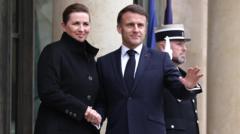In a high-stakes diplomatic tour, Danish Prime Minister Mette Frederiksen addressed regional anxieties about U.S. President Trump's interest in Greenland, reinforcing the territorial sovereignty of the autonomous island.
Danish PM Navigates Tensions Over Greenland Amid EU Diplomacy

Danish PM Navigates Tensions Over Greenland Amid EU Diplomacy
Mette Frederiksen's visit to key European leaders highlights rising concerns over Trump's Greenland acquisition remarks.
Danish Prime Minister Mette Frederiksen embarked on a significant diplomatic mission across Europe, visiting Berlin, Paris, and Brussels within a single day. This whirlwind tour came on the heels of U.S. President Trump's reiterated interest in acquiring Greenland, a territory that holds both strategic and economic relevance for Denmark.
During her meetings with German Chancellor Olaf Scholz and French President Emmanuel Macron, the conversation was largely focused on broader issues, including the ongoing conflict in Ukraine and security threats posed by Russia in the Baltic Sea. Nevertheless, the underlying tension regarding Greenland was palpable, as Denmark grapples with Trump's persistent comments about its sovereignty.
Greenland, an autonomous territory of Denmark, has found itself at the center of international attention following Trump's assertions that he hopes to negotiate its purchase. Despite his statements suggesting a potential U.S. acquisition—he even mentioned, "I think we're going to have it"—Greenland’s Prime Minister Mute Egede firmly declared last week that "Greenlanders don't want to be American."
While the leaders sidestepped direct mention of the situation during their public addresses, Scholz emphasized a broad commitment among allies to respect territorial integrity, hinting at the implications of recent geopolitical tensions. Frederiksen later assured reporters that her European allies had expressed robust support for Denmark’s position regarding Greenland’s autonomy, stating that there exists a "very clear message... that of course there must be respect for territory and the sovereignty of states."
In Brussels, she further indicated that she harbors no concerns over a military threat to either Greenland or Denmark, asserting her view that the U.S. remains Denmark's closest ally. However, she recognized that the nature of collaboration within Europe is shifting under the current U.S. administration.
Frederiksen and Dutch Prime Minister Mark Rutte also discussed the need for strengthening defensive measures within the Arctic, as they focus on maintaining stability in a region of increasing strategic importance.
Although Frederiksen refrained from directly addressing Trump’s acquisition comments, her foreign minister, Lars Lokke Rasmussen, was more forthright, stating emphatically that "Trump would not have Greenland." He reinforced that the Greenlandic people are recognized as a distinct entity under international law, suggesting that any notion of U.S. control is unfounded. When pressed about the implications of an invasion, he declined to speculate, emphasizing the strength of Denmark's territorial claims.
With Denmark pledging significant financial resources—14.6 billion kroner—towards enhancing security in the Arctic in collaboration with Greenland and the Faroe Islands, it is clear that scrutiny on Trump’s ambitions will persist. Danish opposition MP Rasmus Jarlov remarked on the disconnect in U.S. perceptions regarding Greenland, illuminating a misunderstanding about the aspirations of many Greenlanders toward independence rather than assimilation into the United States.
As headlines continue to swirl around Trump’s pursuits, Frederiksen's successful diplomatic outreach serves as a reminder of the resilience of alliances forged over shared respect for sovereign territories.




















